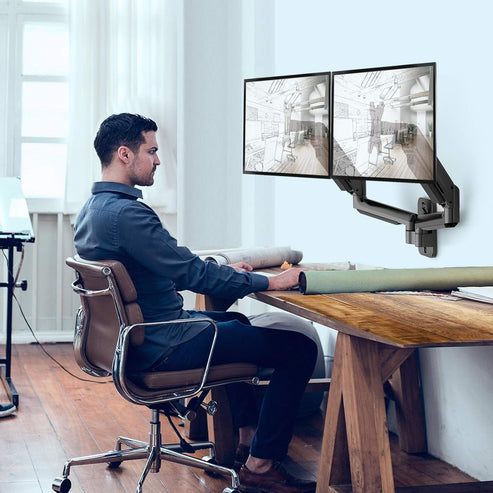In today's digital age, having the right setup for your workspace is essential. One of the most effective ways to optimize your desk space and enhance your viewing experience is by using wall mounts for monitors. This guide will provide you with a comprehensive understanding of how to choose the right wall mount for your monitor.

Understanding Wall Mounts for Monitors
Wall mounts for monitors are devices that allow you to securely attach your monitor to a wall, freeing up valuable desk space. They come in various styles and functionalities, catering to different needs and preferences. But how do you determine which one is best for you?
Types of Wall Mounts
- Fixed Wall Mounts: These mounts hold your monitor in a stationary position. They are ideal for setups where you do not need to adjust the monitor's angle.
- Tilting Wall Mounts: These allow you to tilt the monitor up or down, which can help reduce glare from windows or overhead lights.
- Full-Motion Wall Mounts: Also known as articulating mounts, these provide the most flexibility. You can extend, retract, tilt, and swivel your monitor to achieve the perfect viewing angle.
Benefits of Using Wall Mounts for Monitors
Choosing to use wall mounts for monitors offers several advantages:
- Space-Saving: By mounting your monitor on the wall, you can reclaim valuable desk space for other essential items.
- Improved Ergonomics: Wall mounts allow you to position your monitor at eye level, reducing neck strain and promoting better posture.
- Enhanced Aesthetics: A clean, uncluttered workspace can improve your overall productivity and focus.
Factors to Consider When Choosing Wall Mounts for Monitors
When selecting the right wall mount, consider the following factors:
- Monitor Size and Weight: Ensure that the wall mount can support the size and weight of your monitor. Most mounts specify the compatible size range.
- VESA Compatibility: Check if your monitor has VESA mounting holes. Most wall mounts are designed to fit standard VESA patterns.
- Wall Type: Consider the type of wall you will be mounting to (drywall, concrete, etc.) and choose a mount that is suitable for that surface.
Installation Tips for Wall Mounts
Installing wall mounts for monitors can be straightforward if you follow these tips:
- Gather all necessary tools, including a drill, level, and stud finder.
- Mark the desired height on the wall and ensure it is level.
- Securely attach the mount to the wall, following the manufacturer's instructions.
For a wide selection of quality wall mounts for monitors, consider visiting . They offer various options that cater to different needs and preferences.
Conclusion
Choosing the right wall mount for your monitor can significantly enhance your workspace. By understanding the types, benefits, and installation tips, you can make an informed decision that suits your needs. Whether you opt for a fixed, tilting, or full-motion mount, the right choice will lead to a more organized and ergonomic workspace.








